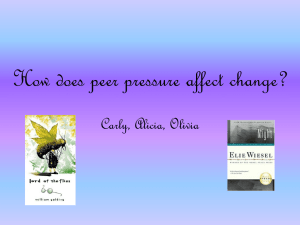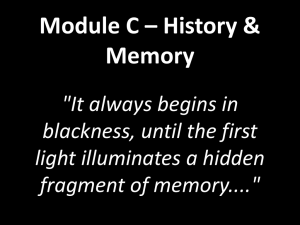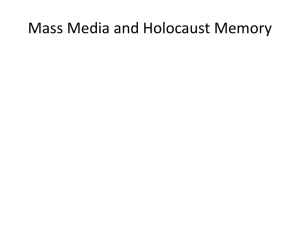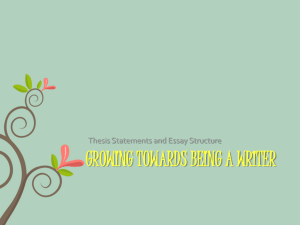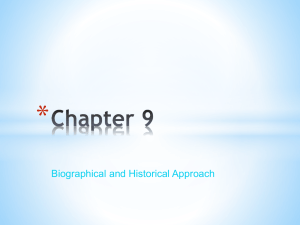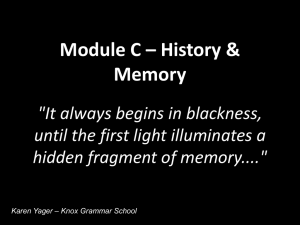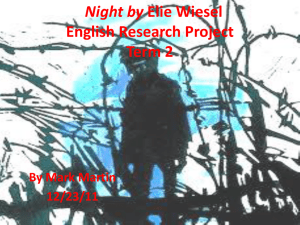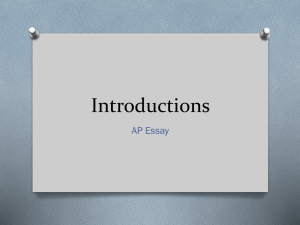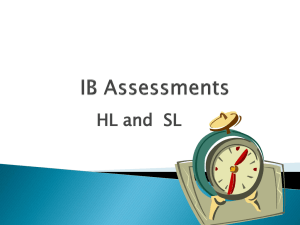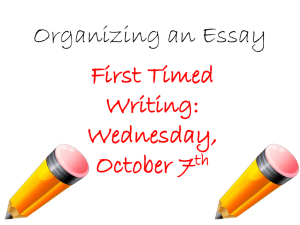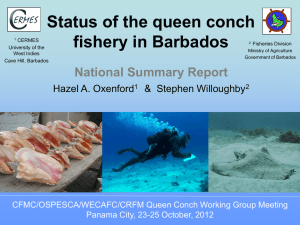Who Am I?
advertisement
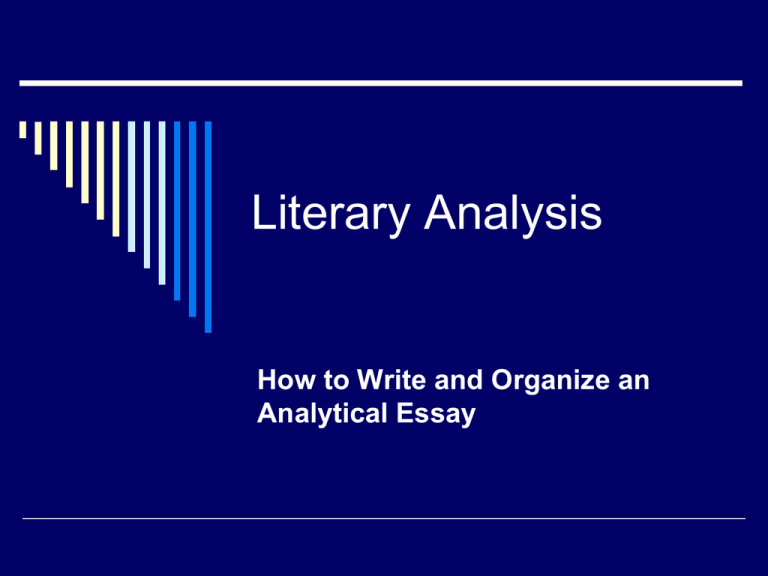
Literary Analysis How to Write and Organize an Analytical Essay INTRODUCTION Begin with an attention getter. Then transition from the attention getter to the point of the essay. Finally, write the thesis statement, the sentence which will control the entire essay and give the reader direction. Attention Getter Ask a question Tell personal a story (anecdote) Describe a setting State a fact Make a controversial statement Quote someone Make a personal statement Attention Getter: Question Did you ever wonder why history is a required subject in school? What do the experiences of a previous generation have to do with me, right here and right now? Attention Getter: Anecdote It was one of the hottest days that Germany had experienced in 2002. And it was on that day that I found myself walking along a stone covered street separating rows of barracks that had once housed enemies against the Third Reich. Attention Getter: Description The temperatures were nearing 100 degrees. There were no trees shading the expanse of stone covering the ground between the barracks, and no access to relief from the oppressive heat, either in the buildings or outside. Attention Getter: Fact The term “holocaust,” a word originally taken from Greek, means “sacrifice by fire” (Webster’s Collegiate Dictionary). Controversial Statement The Holocaust is a hoax. Quote Someone “Patterns of the past echo in the present and resound through the future.” These words, written by Dhyani Ywahoo, . . . Personal Statement Reaching an understanding of who I am continues to be an ongoing challenge, even though I have lived more than five decades. Writing a Transitional Phrase The term “holocaust,” a word originally taken from Greek, means “sacrifice by fire” (Webster’s Collegiate Dictionary). That denotation provides another level of understanding to the events which occurred during Hitler’s reign in Germany. He was literally sacrificing an entire race, as well as anyone who opposed his policies, as a means of “cleansing” his world. By looking at the imagery provided in Elie Wiesel’s Night, the reader is able to experience both the “sacrifice” and the “fire” present during The Holocaust. It is in this way that one recognizes the power of the period, but the story does more than recount the events of an historic era. Another sample (“Auschwitz”) “Patterns of the past echo in the present and resound through the future.” These words, written by Dhyani Ywahoo, remind the reader that the events of the past, and even more importantly, the decisions an individual makes relevant to those events, both at the time and later, impact the future, both for the individual and for society. “Auschwitz,” by Salvatore Quasimodo, emphasizes the importance of personal choice. Personal choices play a part in events, even those beyond personal control; individuals are able to impact outcomes, even overcomes from bad events like the Holocaust. Therefore, individuals have the power to control the future. Evil does not have to win. Thesis Statement This statement is the one which directs the reader’s attention to the point of the essay. It should be simple and direct. Do not use “because” in the thesis statement. Do not write complex sentences or compound sentences as a thesis. Theme Ideas (Potential Thesis) Man’s search for meaning Man’s inhumanity to man Good vs. Evil Hope in the midst of despair The resiliency of the human spirit Personal worth need not be dictated by the opinions of others Thesis Statement Sample Night teaches the reader the role of sacrifice in the context of society. Introductory Paragraph The term “holocaust,” a word originally taken from Greek, means “sacrifice by fire” (Webster’s Collegiate Dictionary). Our current connotation of “holocaust” provides another level of understanding to the events which occurred during Hitler’s reign in Germany. He was literally sacrificing an entire race, as well as anyone who opposed his policies, as a means of “cleansing” his world. By looking at the imagery provided in Elie Wiesel’s Night, the reader is able to experience both the “sacrifice” and the “fire” present during The Holocaust. It is in this way that one recognizes the power of the period, but the story does more than recount the events of an historic era. Night teaches the reader the role of sacrifice in the context of society. Introductory Paragraph “Patterns of the past echo in the present and resound through the future.” These words, written by Dhyani Ywahoo, remind the reader that the events of the past, and even more importantly, the decisions an individual makes relevant to those events, both at the time and later, impact the future, both for the individual and for society. “Auschwitz,” by Salvatore Quasimodo, emphasizes the importance of personal choice. Personal choices play a part in events, even those beyond personal control; individuals are able to impact outcomes, even overcomes from bad events like the Holocaust. Therefore, individuals have the power to control the future. Evil does not have to win. Introductory Paragraph Write the essay Compile notecards Outline paragraph topics relevant to thesis Write a rough draft Conference with the instructor Edit the draft Submit the final copy Outline Introduction Conclusion Conclusion Reminder of the point of the essay (restatement of the thesis) Where did the essay take you? What were the discoveries? What insight does this provide? In your understanding of the novel? In your understanding of life? Idea Draft for Lord of the Flies Conch is a symbol of social order Parallel between the appearance of the conch and social order Social order is extremely important Social order is fragile, can be destroyed Without social order society crumbles Nurture and care for social order Conclusion Draft By the conclusion of William Golding’s Lord of the Flies, the conch is gone, shattered, and with it social order on the island. Throughout the novel the fate of the conch parallels the social order on the island. Through the conch we discover the importance of order and its fragility. Social order can be destroyed. Therefore, it becomes obvious that it must be cared for. Without social order humanity moves into chaos and destruction; society crumbles. Conclusion By the close of William Golding’s novel, the conch is gone. The security and sense of community which the conch provides early in Lord of the Flies parallels the role social order plays in daily life. The conch becomes our visual guide to order’s role in human existence. Without order chaos ensues. Social order cannot be taken for granted. Like the conch it can be shattered, taking with it security, a sense of community, and potentially, man’s very existence.
